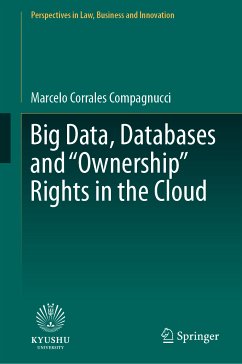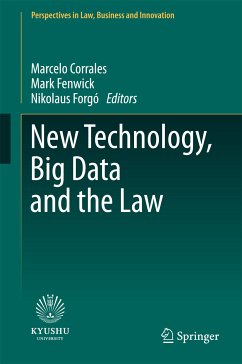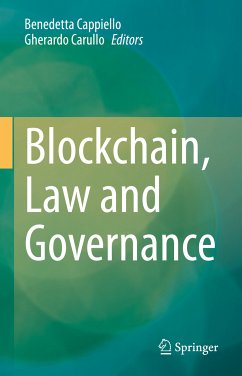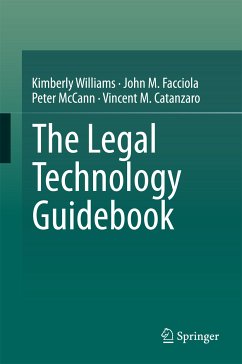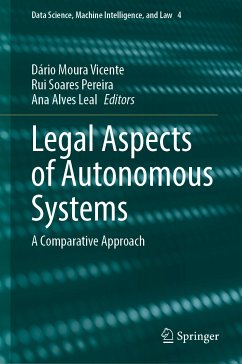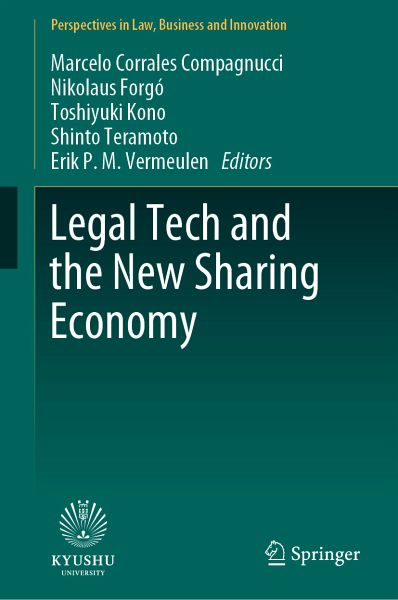
Legal Tech and the New Sharing Economy (eBook, PDF)
Versandkostenfrei!
Sofort per Download lieferbar
96,95 €
inkl. MwSt.
Weitere Ausgaben:

PAYBACK Punkte
48 °P sammeln!
The exponential growth of disruptive technology is changing our world. The development of cloud computing, big data, the internet of things, artificial intelligence, machine learning, deep learning, and other related autonomous systems, such as self-driving vehicles, have triggered the emergence of new products and services. These significant technological breakthroughs have opened the door to new economic models such as the sharing and platform-based economy. As a result, companies are becoming increasingly data- and algorithm-driven, coming to be more like "decentralized platforms". New tran...
The exponential growth of disruptive technology is changing our world. The development of cloud computing, big data, the internet of things, artificial intelligence, machine learning, deep learning, and other related autonomous systems, such as self-driving vehicles, have triggered the emergence of new products and services. These significant technological breakthroughs have opened the door to new economic models such as the sharing and platform-based economy. As a result, companies are becoming increasingly data- and algorithm-driven, coming to be more like "decentralized platforms". New transaction or payment methods such as Bitcoin and Ethereum, based on trust-building systems using Blockchain, smart contracts, and other distributed ledger technology, also constitute an essential part of this new economic model.
The sharing economy and digital platforms also include the everyday exchange of goods allowing individuals to commodify their surplus resources.Information and innovation technologies are used in order to then match these resources with existing demand in the market. Online platforms such as Airbnb, Uber, and Amazon reduce information asymmetry, increase the value of unused resources, and create new opportunities for collaboration and innovation. Moreover, the sharing economy is playing a major role in the transition from exclusive ownership of personal assets toward access-based exploitation of resources. The success of online matching platforms depends not only on the reduction of search costs but also on the trustworthiness of platform operators.
From a legal perspective, the uncertainties triggered by the emergence of a new digital reality are particularly urgent. How should these tendencies be reflected in legal systems in each jurisdiction? This book collects a series of contributions by leading scholars in the newly emerging fields of sharing economy and Legal Tech. The aim of the book is to enrich legaldebates on the social, economic, and political meaning of these cutting-edge technologies. The chapters presented in this edition attempt to answer some of these lingering questions from the perspective of diverse legal backgrounds.
The sharing economy and digital platforms also include the everyday exchange of goods allowing individuals to commodify their surplus resources.Information and innovation technologies are used in order to then match these resources with existing demand in the market. Online platforms such as Airbnb, Uber, and Amazon reduce information asymmetry, increase the value of unused resources, and create new opportunities for collaboration and innovation. Moreover, the sharing economy is playing a major role in the transition from exclusive ownership of personal assets toward access-based exploitation of resources. The success of online matching platforms depends not only on the reduction of search costs but also on the trustworthiness of platform operators.
From a legal perspective, the uncertainties triggered by the emergence of a new digital reality are particularly urgent. How should these tendencies be reflected in legal systems in each jurisdiction? This book collects a series of contributions by leading scholars in the newly emerging fields of sharing economy and Legal Tech. The aim of the book is to enrich legaldebates on the social, economic, and political meaning of these cutting-edge technologies. The chapters presented in this edition attempt to answer some of these lingering questions from the perspective of diverse legal backgrounds.
Dieser Download kann aus rechtlichen Gründen nur mit Rechnungsadresse in A, B, BG, CY, CZ, D, DK, EW, E, FIN, F, GR, HR, H, IRL, I, LT, L, LR, M, NL, PL, P, R, S, SLO, SK ausgeliefert werden.





